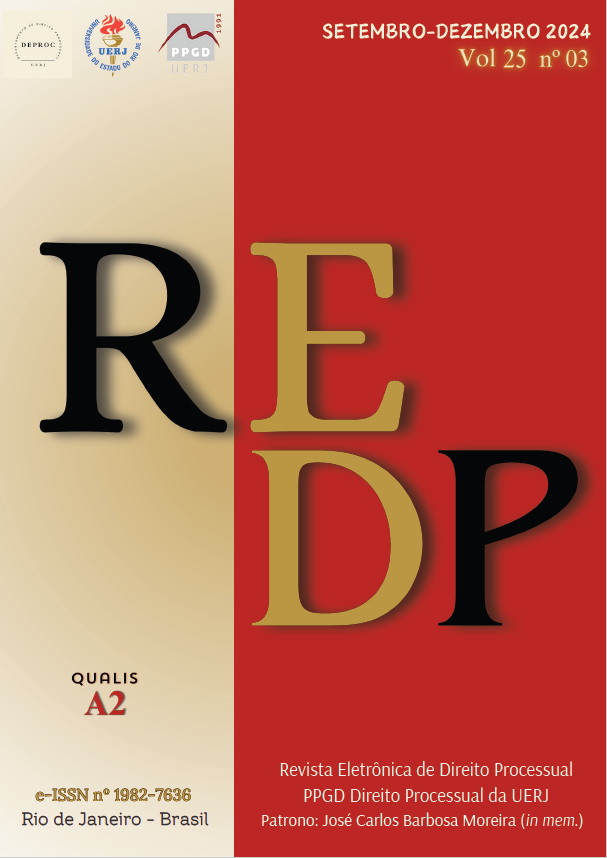REPRESENTATIVIDADE ADEQUADA: ENTRE AÇÕES COLETIVAS E PRECEDENTES VINCULANTES
DOI:
https://doi.org/10.12957/redp.2024.86617Resumo
O propósito deste artigo é analisar a relação entre ações coletivas e precedentes vinculantes no Direito brasileiro, especificamente à luz da representatividade adequada. As ações coletivas, assim como os precedentes vinculantes, possuem a aptidão de produzir resultados universalizáveis, ou seja, cujo aproveitamento alcança diretamente o grupo, a classe ou a categoria de pessoas titulares de um determinado interesse jurídico. Não por outra razão, ambos são tratados doutrinariamente como modalidades distintas de tutela jurisdicional coletiva. Todavia, observa-se que apenas quanto às ações coletivas é que se exige, como pressuposto de validade, a existência de representatividade adequada ao legitimado coletivo. O estudo baseia-se, quanto à metodologia, na investigação bibliográfica e também na análise das principais decisões proferidas pelos tribunais brasileiros. Verificou-se que a representatividade adequada desempenha papel fundamental não apenas para a validade formal do processo coletivo, mas também para a concretização da garantia do devido processo legal, e que tais atributos devem também estar presentes quando se tratar de precedentes vinculantes, dada a existência de interesses coletivos em disputa. Por outro lado, também se verificou que o intercâmbio normativo entre ações coletivas e precedentes vinculantes se mostra, ao menos inicialmente, apto a oferecer mecanismos de atribuição e controle da representatividade adequada. À guisa de conclusão, se é possível compreender que os microssistemas de tutela coletiva e de julgamento de casos repetitivos comunicam-se e, mais do que isso, formam um arcabouço normativo comum, cujos efeitos espraiam-se sobre relações jurídicas transindividuais, há que se compreender também que a tutela adequada dos interesses coletivos lato sensu, no contexto de precedentes obrigatórios, impõe a adoção de mecanismos de proteção da coletividade, notadamente quanto à atribuição e controle da representatividade adequada em favor dos ausentes.
Downloads
Publicado
Como Citar
Edição
Seção
Licença
Copyright (c) 2024 Gustavo Viegas Marcondes

Este trabalho está licenciado sob uma licença Creative Commons Attribution 4.0 International License.
Todos os artigos publicados na Revista Eletrônica de Direito Processual (REDP) (Departamento de Direito Processual, Universidade do Estado do Rio de Janeiro, Brasil) são licenciados por meio de uma Licença Creative Commons - Atribuição 4.0 Internacional (CC BY 4.0).
Os autores retêm os direitos autorais de seu artigo e concordam em licenciar seu trabalho com a licença CC BY 4.0, aceitando assim os termos e condições específicos desta licença disponíveis no seguinte website: https://creativecommons.org/licenses/by/4.0/legalcode.
- Os autores concedem à REDP o direito de primeira publicação, de se identificar como publicadora original do trabalho e concedem à revista uma licença de direitos não exclusivos para utilizar o trabalho das seguintes formas: Reproduzir, vender e distribuir cópias eletrônicas ou impressas do manuscrito como um todo, de partes específicas do manuscrito e de suas traduções para qualquer idioma;
- O uso do artigo por terceiros é livre, contanto que a integridade da publicação seja mantida e seus autores originais, periódico de primeira publicação e detalhes de citação sejam identificados.
Dentro dos termos da licença, os autores podem entrar em acordos contratuais adicionais separados para a distribuição não exclusiva da versão publicada do trabalho na revista.
Copyright and Licensing
All articles published in the Procedural Law Electronic Review (REDP) (Department of Procedural Law, State University of Rio de Janeiro, Brazil) are licensed under a Creative Commons License - Attribution 4.0 International (CC BY 4.0).
- Authors retain copyright to their article and agree to license their work under the CC BY 4.0 license, thereby accepting the specific terms and conditions of this license available at the following website: https://creativecommons.org/licenses/by/4.0/ legal code.
- Authors grant REDP the right of first publication, to identify itself as the original publisher of the work, and grant the journal a non-exclusive license to use the work in the following ways: Reproduce, sell and distribute electronic or printed copies of the manuscript as a whole, of specific parts of the manuscript and its translations into any language;
- Use of the article by third parties is free, as long as the integrity of the publication is maintained and its original authors, first publication journal, and citation details are identified.
Within the terms of the license, authors may enter into separate additional contractual agreements for the non-exclusive distribution of the published version of the work in the journal.




